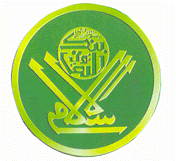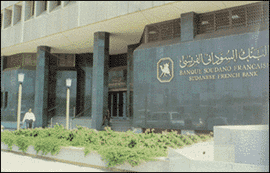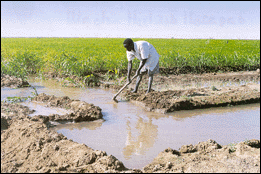 FINANCE COMMUNITY FINANCE COMMUNITY |
In general the finance sector has suffered significantly from the war, which continuously has and does not only create caution among investors, but has also damaged the Sudan's relations with many states and international organisations. However, to the surprise of many, the Sudan offers very stable and safe investment opportunities.

Inflation target for the end of the year 2001 is 5%, GDP growth expectation is 6,5% and the exchange rate has been fixed for the last three years without creating a parallel market. Major improvements on their way currently are the streamlining fiscal and monetary policies, and the improvement of the non-oil taxes and revenues. On dhe structural level, the privatisation program is the priority, and the successful recent examples Sudatel and Sudan Airways have made many investors very keen on this vast African country. The former, the national telecommunication company, lost its monopoly in July 2001. The latter, the national airline, which has a potential of becoming the connector between the Gulf, Asia and Africa, is currently selling 51% of its shares.
Surely it is the political situation that is mostly hindering the economic development of the Sudan. The war in the South, particularly since the oil discoveries few years ago, has encountered an increasing number of complications. However, the recent visit of the Libyan leader Gaddafi to the Sudan in July 2001 resulted in optimism, which will hopefully spread trust over to the domain of investments.
The positive correlation between peaceful political situation and sound base for economic improvement has been clearly understood by the government, as The Governor of Bank of Sudan, Dr. Sabir M. Hassan says. "We really have fulfilled all requirements of external debts program RAP and HIPC, but we are not getting the result we would deserve, and the main reason for that is the political situation. This is really unfortunate, and we are working on the political side because the world now has very strong interrelation between the politics and economics".
Just over two years ago, in March 1999, the Sudanese government reached an understanding with IMF on the medium-term reform and adjustment program, monitored by IMF, aimed to be implemented within next two years. Basically this agreement was a continuation of the previous programs that have been implemented during the whole 90's decade, in fact starting in 1992. Goals of those reforms of the early 90's decade were mainly to streamline investment procedures, to initiate a public sector reform and privatisation program, to institute major agricultural reforms, to eliminate most of the non-targeted consumer subsidies, and to partially liberalize the foreign trade and exchange regimes. Even if the response was positive to these reforms, high inflation continued due to weak fiscal, monetary policies and inadequate exchange rate regime.
It was not until after the reforms of 1997-8 when the substantial macro-economic stability was achieved providing a proper foundation for sustainable economic growth. This had required tightening and rebalancing fiscal, monetary and external policies as explained in the next paragraph.
Major macroeconomic indicators started showing positive trend in the 1997-8 period. The GDP growth average reached 6 %, and inflation dropped from three digit figure down to two digit figure; from 133% in 1996 to 17% in 1998. Rates of return on deposits became positive in real terms, financial disintermediation was halted, the foreign exchange market was unified, private transfers from abroad increased, export volume growth was strong, and the current account deficit declined from 7,6 % of GDP in 1996 to 4,1 % in 1998 (on a cash bases and excluding public transfers and oil-pipeline related imports). It is worth noticing also that the two instruments, compatible with Islamic finance principles and suitable for indirect monetary control (the Central and Musharaka Certificate) and non-inflationary financing of the budget (the Government Musharaka Certificate)were introduced for the first time in the Sudan to guideline the economic activities according to the Sharia; the Islamic law.
Despite these huge steps, the Sudan still continued facing fundamental obstacles on the way towards the liberalisation of the economy at the turn of the millennium. These problems had however more to do with the matters related to the war in the South, infrastructure, and external debt. The infrastructure is a necessary facility a country needs to be able to offer to an investor, and it is a requirement that needs to be fulfilled in order to fasten the economic growth by promoting the trade. In the Sudan infrastructure has suffered from under investment, which reflects a weak taxation system. On a more political level, the decades lasting war in the South has added up to a bad image the country faces abroad. Especially recently it has divided the foreign states to two categories; those following the US policy towards the Sudan and those separating politics and economic and still pursuing economic interest despite of the present war (mainly the Asians). The most serious and profound way the war is affecting the economy is that it prevents constructive use and reallocation of the budgetary sources. Moreover, it has poisoned many diplomatic relations, further creating limitations to external resources and concurrently making the sensitive private sector cautious. On the top of all this, typical to an African country at as infancy stage as the Sudan, the external debt is depressingly heavy. It is due to the political situation, not economic achievements that the country is not welcomed into certain international debt relief programs.
The reforms initiated in March 1999 continued the macroeconomic stabilization and liberalization of the economy. They envisaged i) maintaining economic growth of about 5,5,%, with the possibility of accelerating growth to 7-8% if external support for infrastructure rehabilitation were to resume; ii) reducing inflation below 5 % by 2001; and iii) lowering the external current account deficit (on a cash basis and excluding the oil trade and pipeline related imports). In support of the above objectives, and given the absence of external financing, the program targeted virtual balance on a cash bases of the government budget over the medium term. Strengthened revenue mobilization, notably through the introduction of the value added tax in 2000, was to be accompanied by continued restraint on non-priority spending, while providing the targeted increase in public investment and social outlays. This was planned to allow a substantial increase in credits to the private sector in support of the growth while gradually reducing the rate of money growth, consistent with the external and inflation targets. The program also envisaged wide-ranging structural reforms, including the privatisation and/or restructuring of public enterprises, improving the functioning of the foreign exchange market, encouraging bank intermediation, strengthening social policies with emphasis on human development and poverty alleviation, and an ambitious trade reform.

The normalisation of relations with international and regional financial institution and donors has improved during past years, and especially IMF holds regular meetings with the Sudan and is often very impressed with its economic achievements. Other institutions in collaboration with the Sudan include the World Bank, the African Development Bank, the Islamic Development Bank, the Arab Fund for Economic and Social Development, the Arab Monetary Fund, the Saudi Fund, and the OPEC Fund.
The banking system in the Sudan is facing a fundamental restructuring program scrutinised by the Bank of Sudan. The aim of it is to provide the banks with better means to cope with the globalisation by gradually increasing their capital by the end of the year 2003. Eventually, this will lead them to merge or liquidate and the number of the banks will therefore come from almost 30 down to less than 10.
At the moment the most well-performing banks are Tadamon Islamic Bank, The Financial Investment Bank, Sudanese French Bank, Bank of Khartoum, Animal Resources Bank, Omdurman National Bank, and Sudanese Islamic Bank; whereas on the side of foreign banks there are Mashriq Bank and Bank of Abu Dhabi; the latter providing excellent services up to the western standards. Tadamon Islamic Bank is one of the Islamic banks aiming at remaining one of the leading banks after the reforms have been completed. It is also listed at the Khartoum Stock Exchange. The General Manager, Salah Abu Naga describes its current achievement and commitment to Asia: "We are the first bank in business. We are able to make a lot of foreign investments, and to direct our international business with our foreign correspondents to finance exports and imports. We have contacts in Malaysia and Bahrain, but most of our clients are importing from China, India, Indonesia and Malaysia".
| The Financial Investment Bank, lead by the Chairman Dr. Tag Elsir Mustafa, is one of the most well performing banks at the moment. Its responsibility is not only to serve the traditional commercial banking, but also to work in the stock market; trading shares, funding financial products and establishing public listed companies and put them in the first market and then in the secondary market. The Financial Investment Bank was also involved with the government in the privatisation of some public enterprises. At the beginning it was difficult to convince the government to trust the bank to do this job because before the government used to do this through its special technical committees. The chairman Dr. Tag Elsir Mustafa tells about the bank's current activities: "At the moment we are working in two projects: Free Zones and Roads and Bridges Company. The latter is a fifty-year-old institution and was recently transformed from a public corporation to a private company. We are also working in a number of other projects; similarly we have some private companies, which come to us seeking for advice and help to transform them from private family companies to public listed companies. In addition we also manage a sort of placement of new shares for companies and banks; this is something we have done twice for Sudatel." The Chairman Dr. Tag Elsir Mustafa encourages private companies to go public, and explains the reasons as follows: "One of the strong reasons for going public is that it is easy and more rewarding for them (private companies) to get financial resources from capital market rather than from banking."
Another important institution responsible for the development of the economy and attracting investors is the Sudanese Development Corporation. Its Managing Director Abd Elwahab Ahmed Hamza tells how they can help investors who are in general interested in investing in the Sudan, or those who already have some business ideas: "We are working as a link between the foreign and local investors promoting the current projects in the Sudan. Very often we also go outside the Sudan with a delegation of the ministers since we are in a very close co-operation with the government. The Sudanese Development Corporation is preparing projects according to the need of the country, whether it is electricity, oil, industry or mining, which are the cases at the moment. We prepare the projects with a viability study, and we have a summary of two pages for anybody interested. If the potential investor is more and more interested we give him the whole viability study. It helps also that through these long 25 years we have had good relations and experience with the international institutions. We are now a member of the Islamic Development Bank, the African Development Bank, and we have excellent contacts with the IMF and the World Bank." In the opinion of Abd Elwahab Ahmed Hamza, the most successful current Sudanese projects are the following ones: "Kenana is the best sugar industry making profit for the Saudi government, the Sudanese government and the Kuwait government. In the summer 2001 it was written in the papers that Kenana produces more than 403.000 tons, which is much more than the original plan. This means they have now all the records of the productivity. The Sudanese Development Corporation is also a shareholder in Ariab Mining Company, which is a joint venture between the French government and the Sudanese government.

When choosing the involvement in projects, it is important to the Sudanese Development Corporation to follow the objective according to which the new projects should be export oriented or import substitutions or strategic projects.For example the storage problem is one of the most urgent matters to be solved, and the Sudanese Development Corporation encourages people to get involved n this activity, especially in building cold stores. This is something the private sector could enter in. It is worth noticing that the Sudanese Development Corporation does all its financing according to the Islamic law.
In 1992 the Khartoum Stock Exchange was established, which was an interesting step, as the concept of a stock market never really existed in the Islamic world. However, after some research, it was realised that there are some similarities between the capitalist stock market and the Islamic business world in a way that enabled it possible establish a stock market in the Sudan, which would not contradict the Islamic law Sharia. Following the Sharia law means for example that all the decisions made must be approved by a special sharia committee. The Khartoum Stock Exchange still has very few companies listed, in fact the number of the companies has increased from 34 only up to 44 since its establishment, and for example none of the oil companies are in yet. It is managed by 85% by the Financial Investment Bank. General Manager of the Khartoum Stock Exchange, Hamza Moh. Ginawi, gave his opinion when asked about the most well-performing companies and institutions in the country, and those interesting for investors: "Sudatel is on the top of the list, the Gum Arabic Company is very successful too, and then the number three I would say is the Islamic Investment Company. The latter is a group of companies, with consists of about fourteen sister companies and subsidiaries. Then comes the Sudanese French Bank; in terms of their activity in the market and the percentage of the profit they gain, then the Animal Resources Bank, the Omdurman National Bank, and certainly of course the Financial Investment Bank. There are also some insurance companies, but they are mainly family companies. All over the Arab world you will find that insurance companies are some sort of family companies."
Insurance business also contradicts with the Islamic law sharia and the government's "sudanization" program. Director of The Sudanese Insurance and Re-Insurance, Sabir Abbas M. Fadl, describes what was the situation in his field before: "Before 1971 we used to have a lot of foreign insurance companies and branches from all over the world: UK, Italy and India. The amount was about 38 companies, branches and brokers. Then the whole thing was stopped in 1971 when the government "sudanized" the insurance market. So, since then we don't have any foreign companies operating here in the Sudan." He continues explaining how the insurance world and sharia contradict, and in which ways it can affect investors: "The only obstacle is the law governing insurance activity in the Sudan, which is based on the sharia principles. We are all now Islamic cooperative companies, which means we don't benefit from the insurance activities. There is no profit in insurance companies in this country, so I don't know how that will suit the foreign investors if they are coming with capital to be invested with no return. I think there is no logic unless we really do some amendments and changes to the law allowing the foreign investors to have part of the profit which we now call surplus. Our own idea which we already presented to the authorities is to allow part of the profit or the surplus to be added to the capital. That would initiate further business and save companies, and that could encourage people to put in a lot of capital."
At the moment one of the leaders in the sector, the Sudanese Insurance and Re-Insurance offers all kinds of insurances except life insurance, which as an idea is incompatible with the Islamic mentality. There are only three insurance companies offering life insurances in the Sudan at the moment. Insuring the agriculture sector is also a whole new idea, but keeping in mind the potential of the sector this part of insuring is evaluated very promising. The Sudanese Insurance and Re-Insurance has ideas how to enter the sector: "Our plan is to start insuring the mechanized farms like Gezira board and Rahad scheme, where there is irrigation and electricity. We have to start first with the mechanized schemes and then build up little by little on that. That type of insuring is well known in Europe, like for example hail insurance. It is an interesting form of insuring because it is upon the god and so forth there is no any human control, but still people buy that insurance which makes the insurance companies provide the services. Our philosophy is to start with mechanized schemes as vital projects and then build on with a good reinsurance security." |

